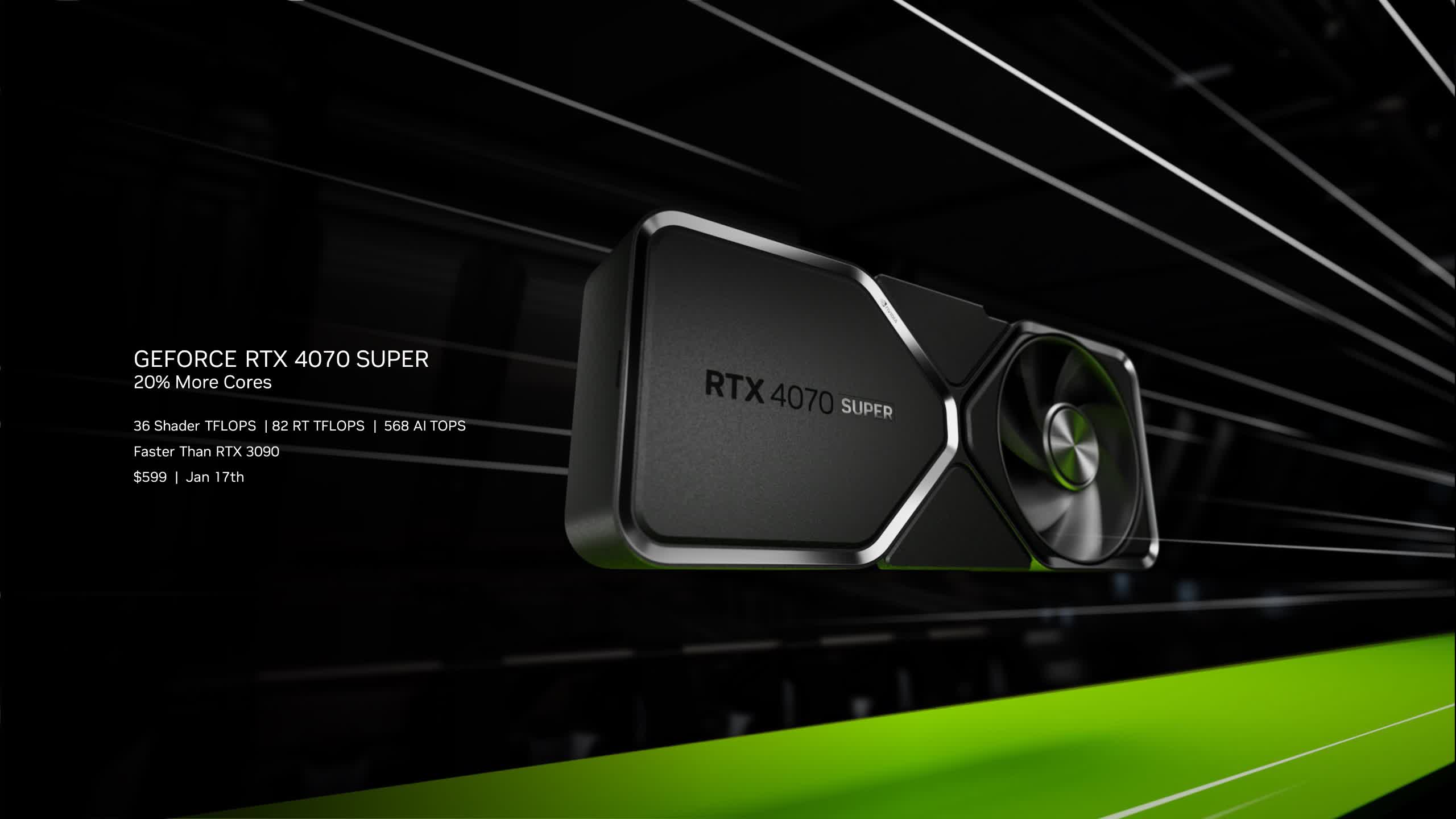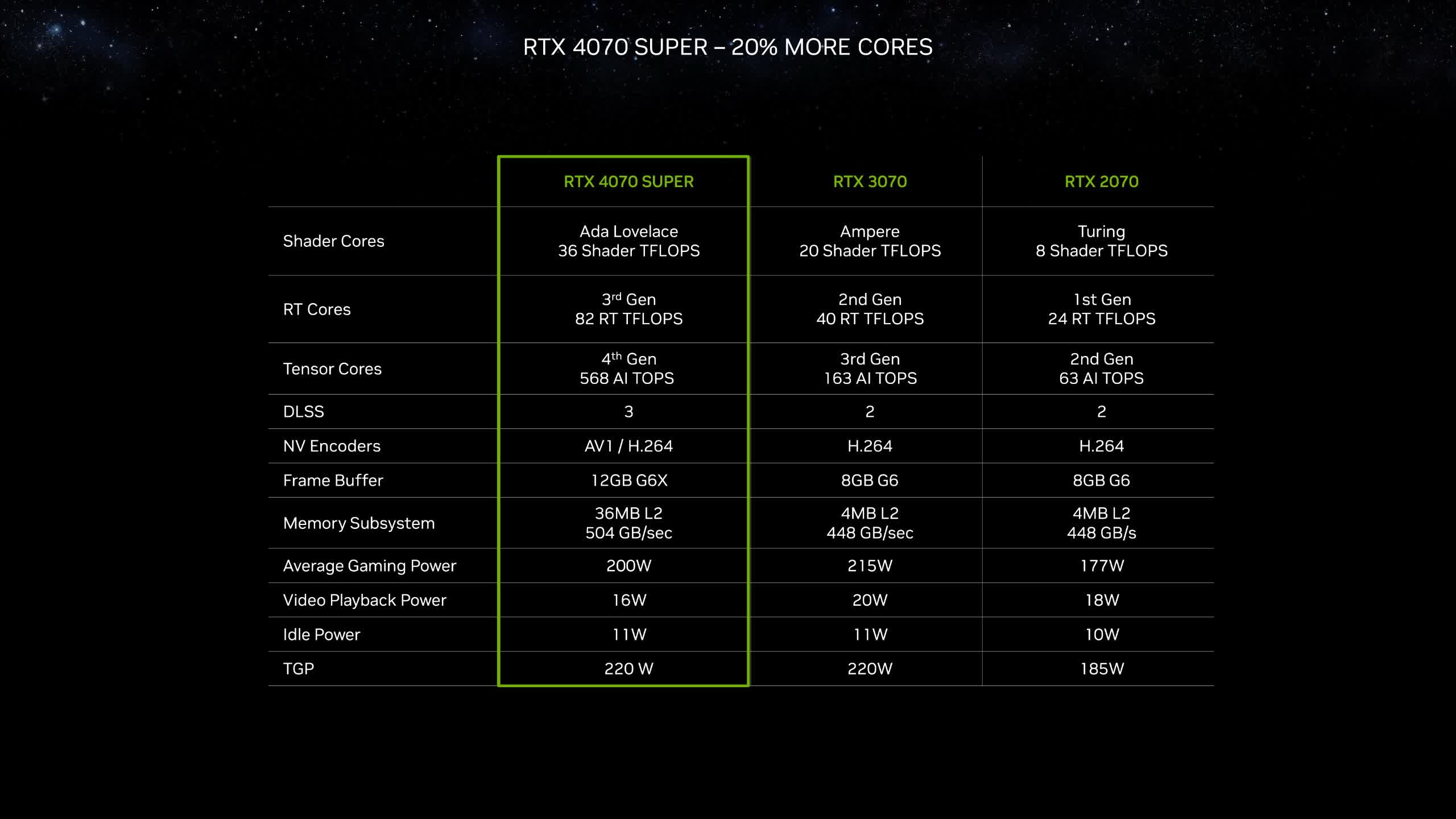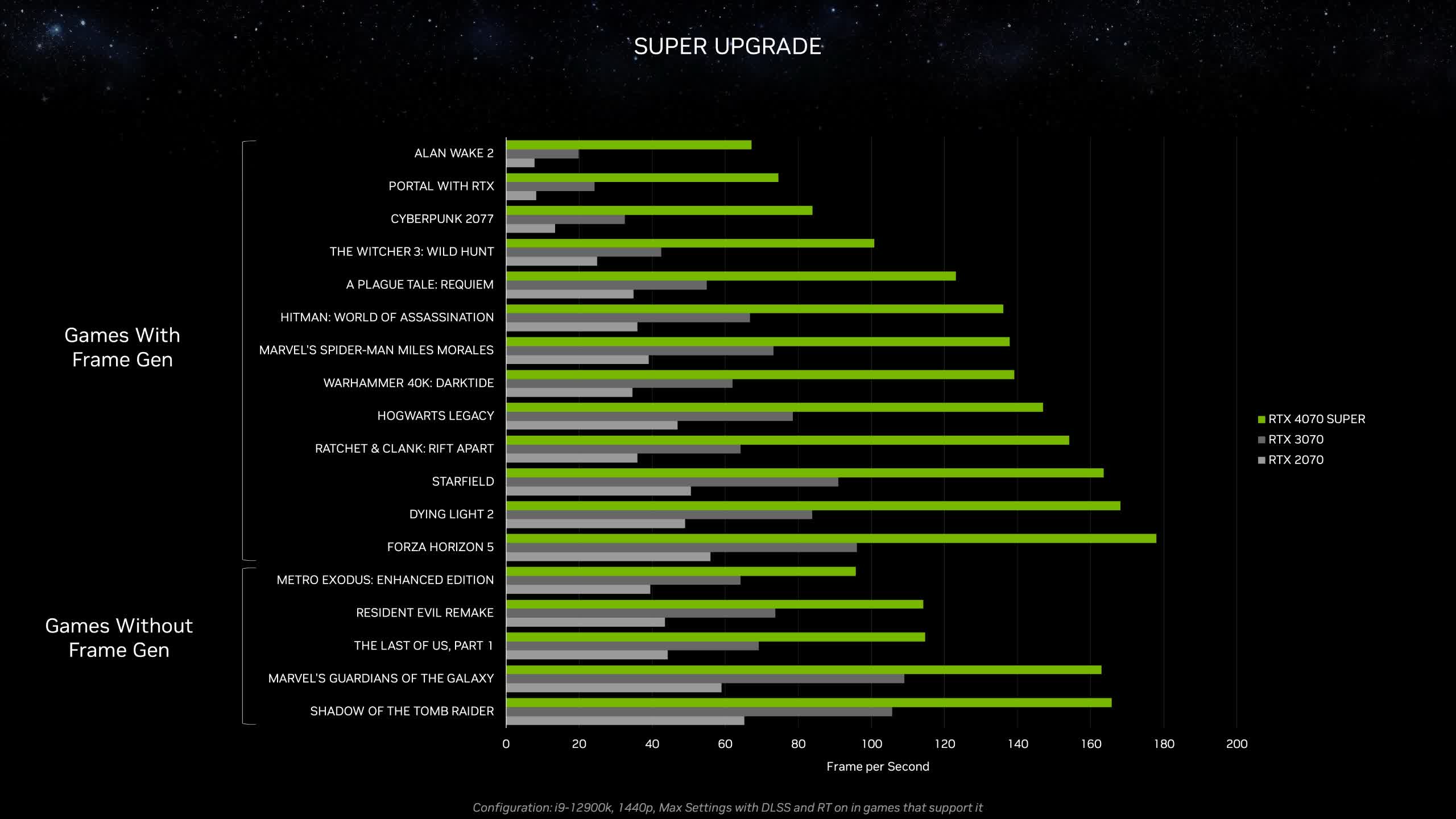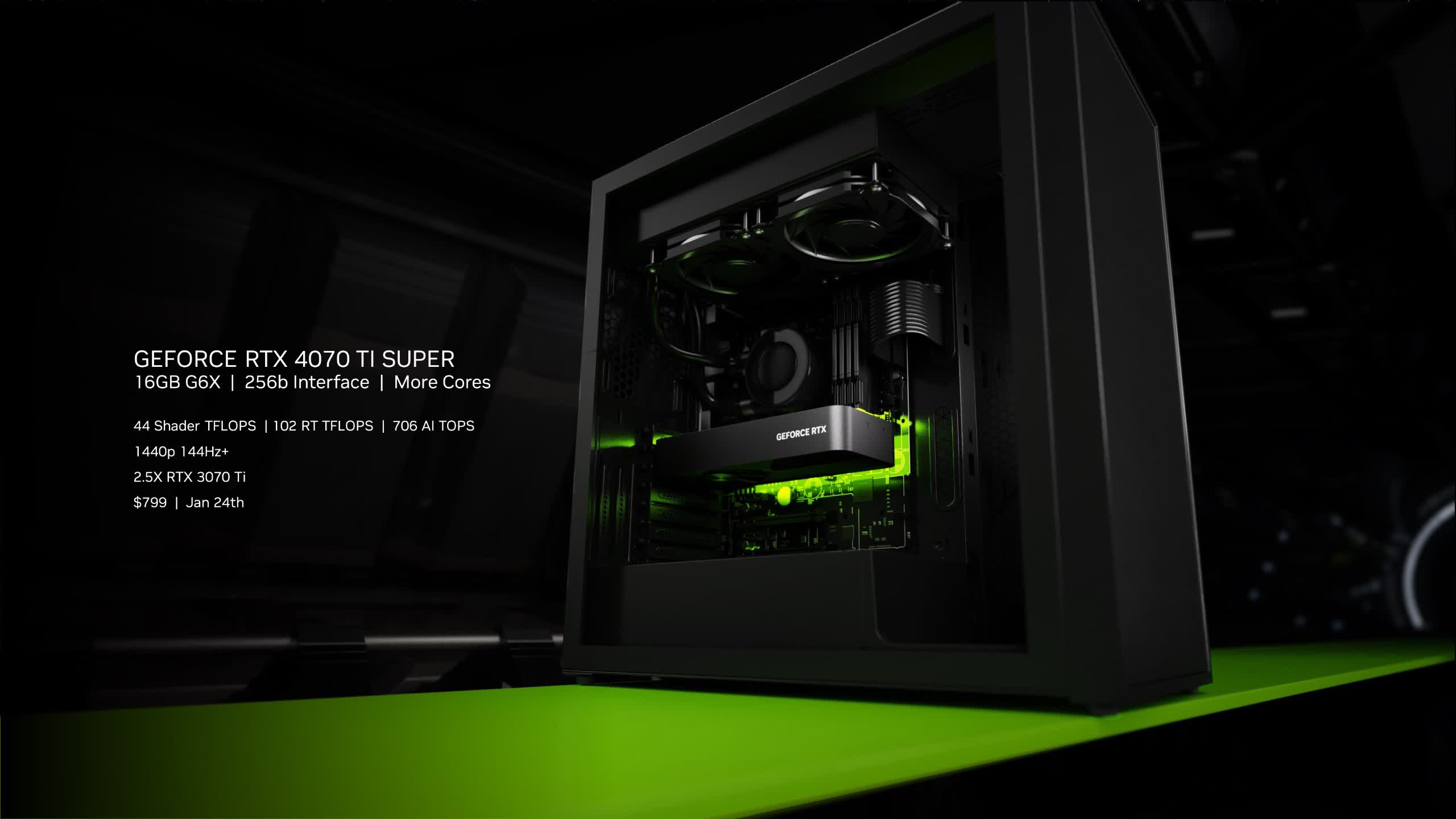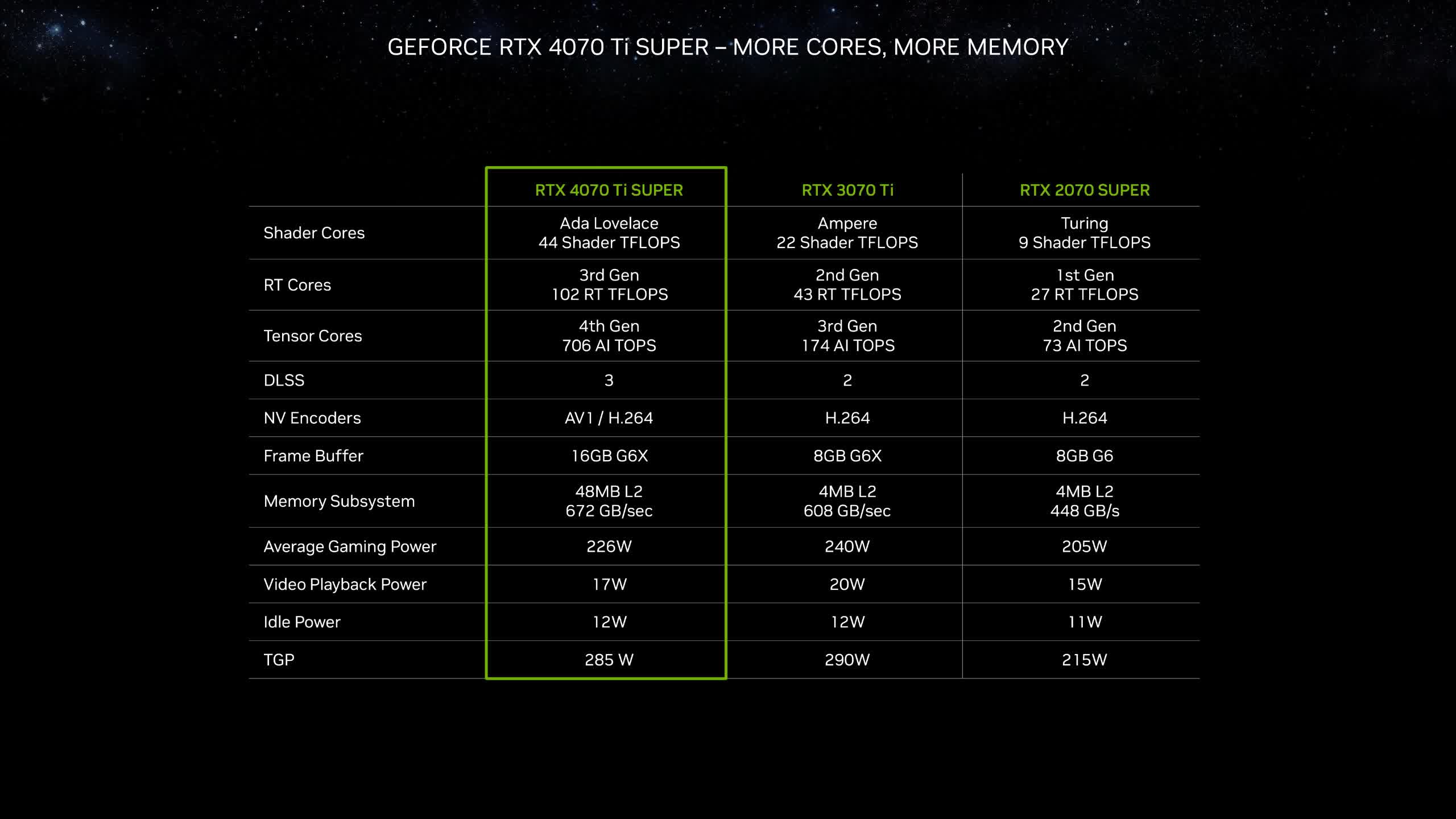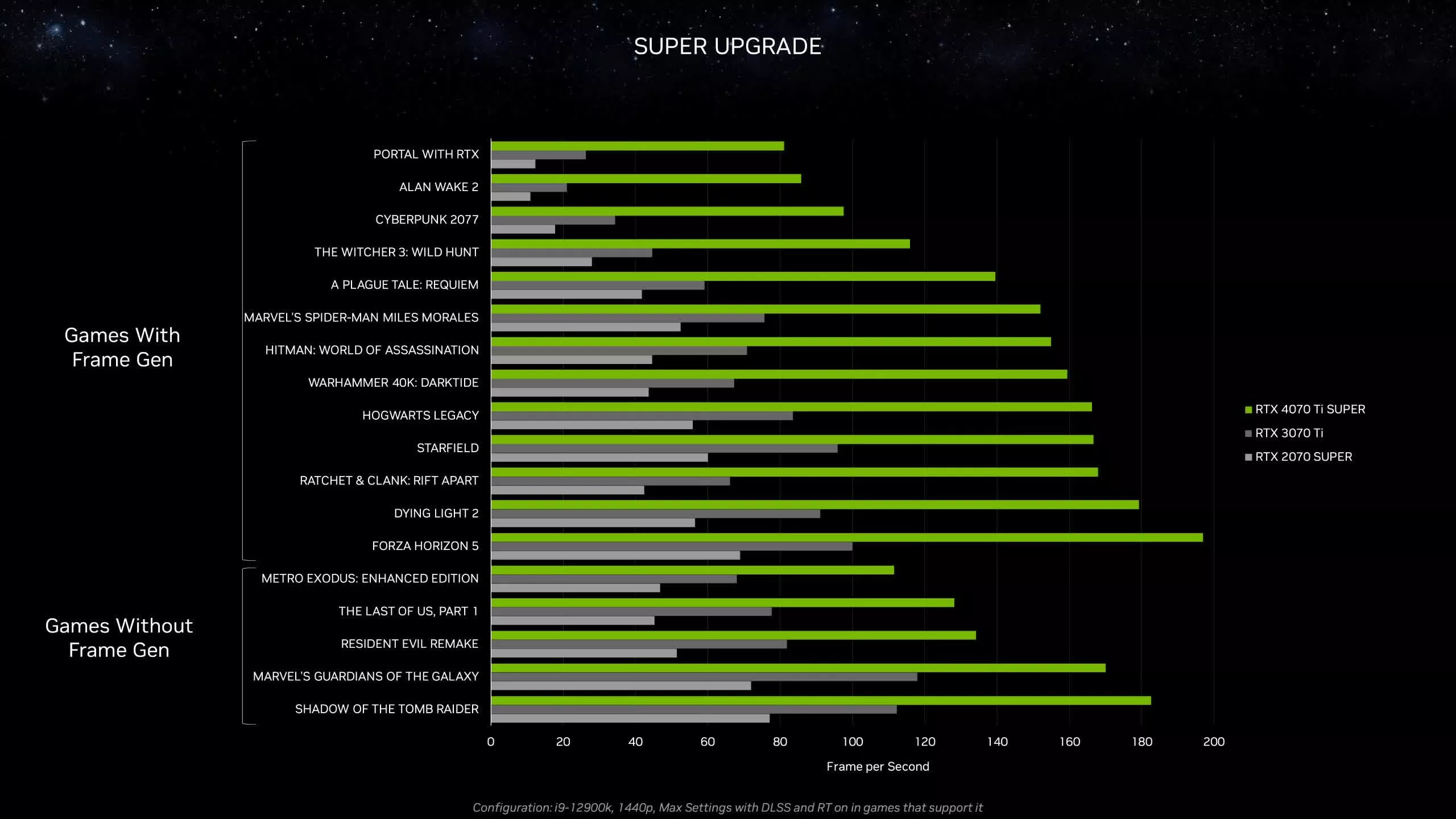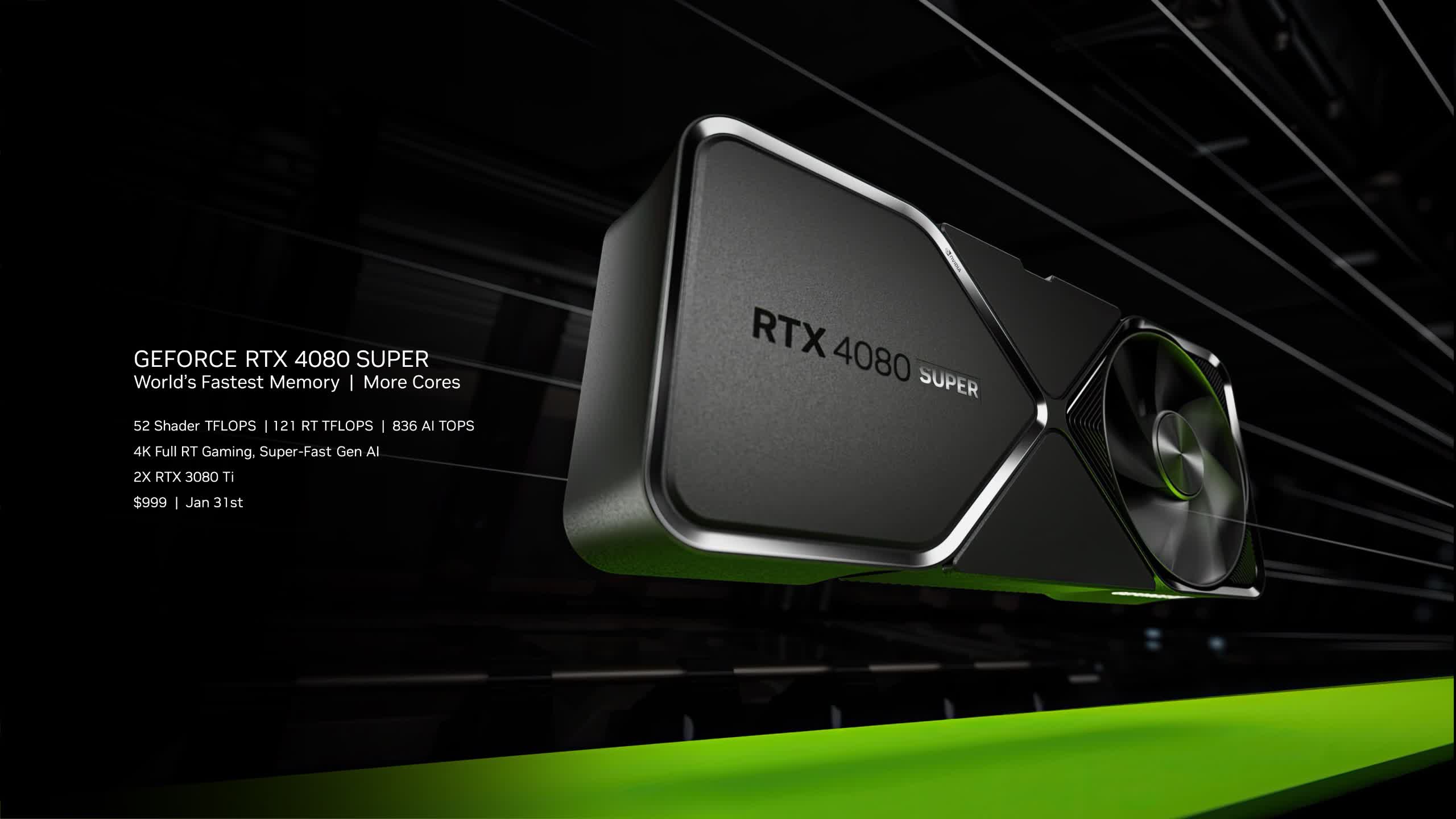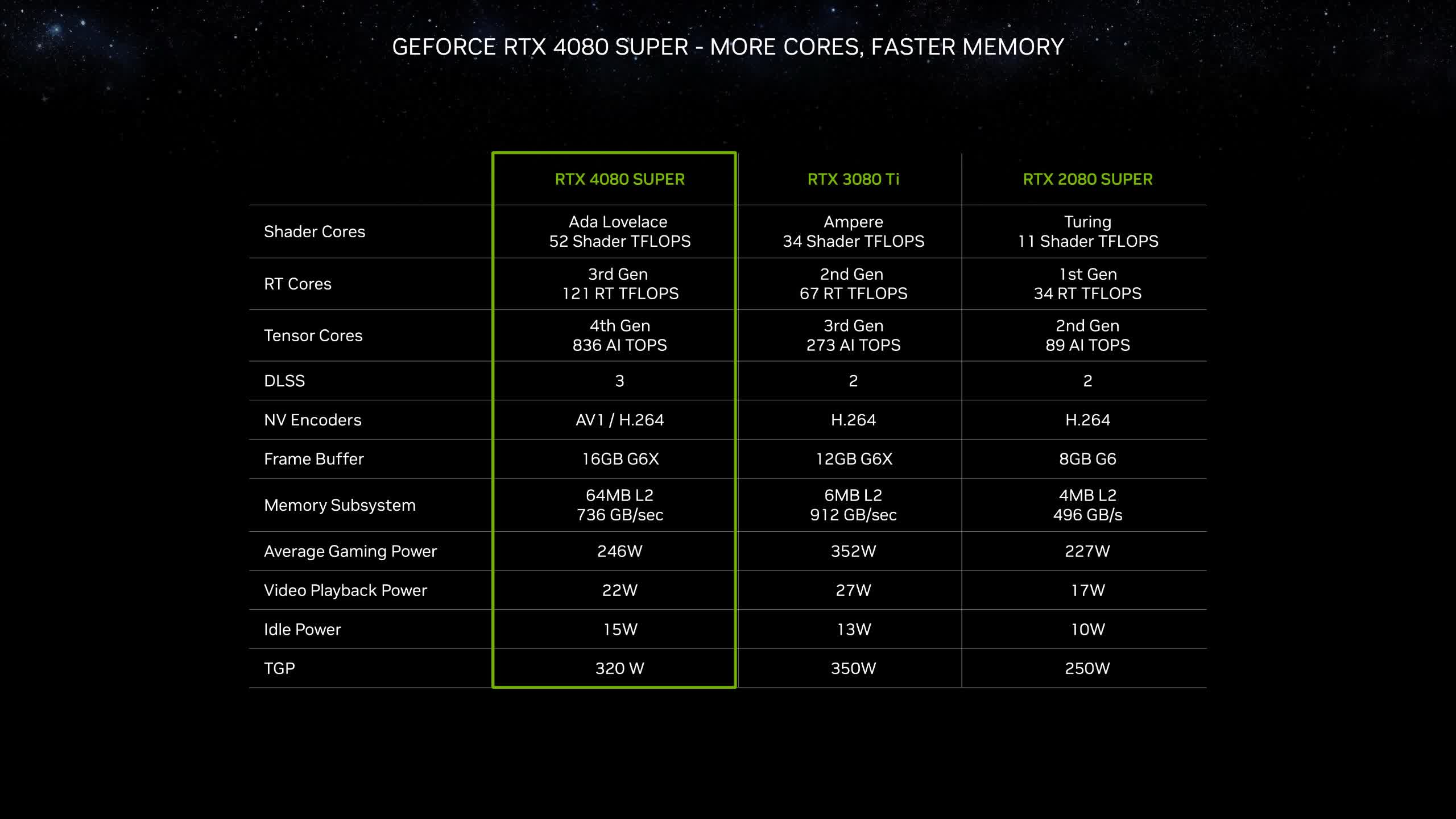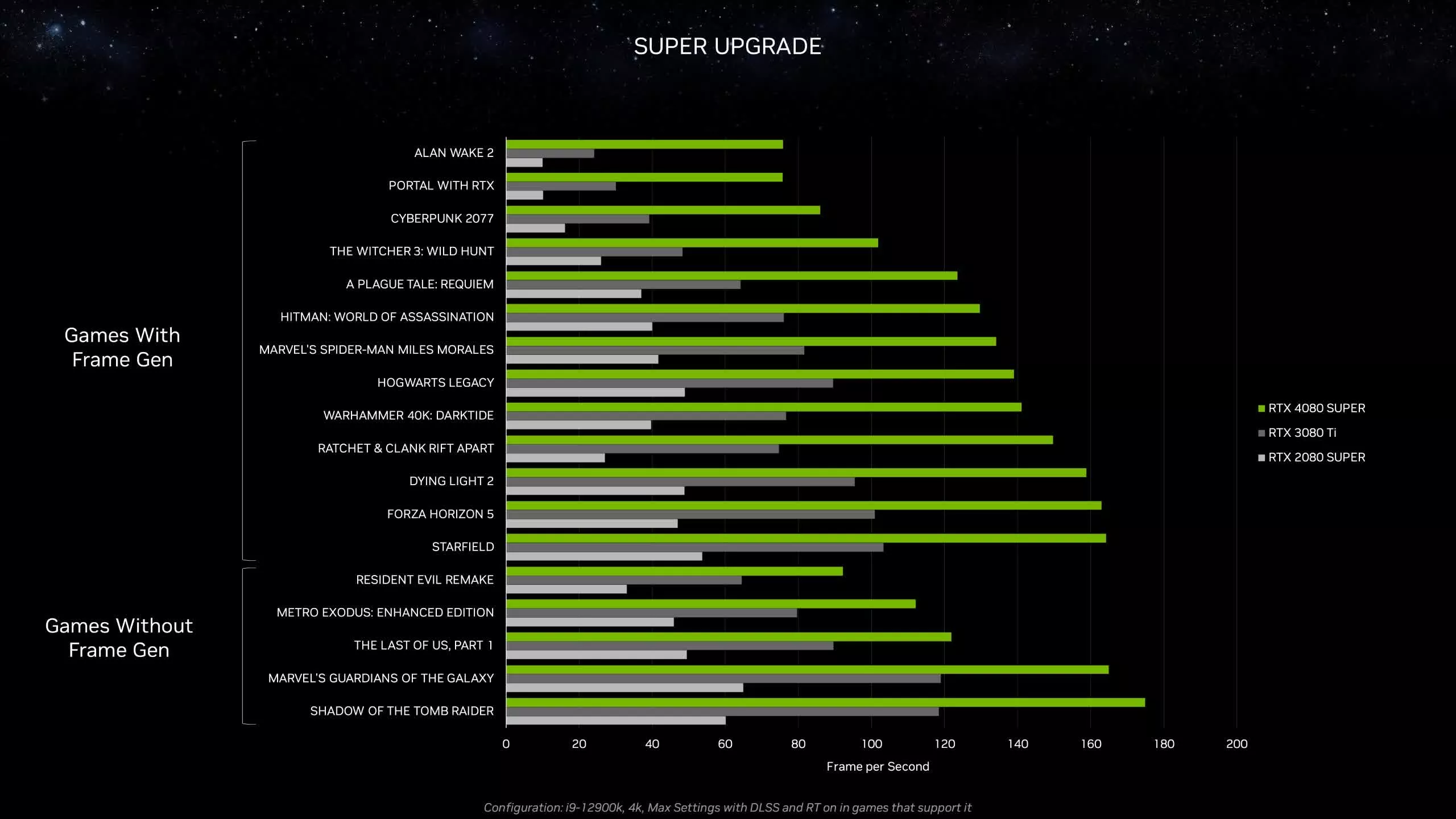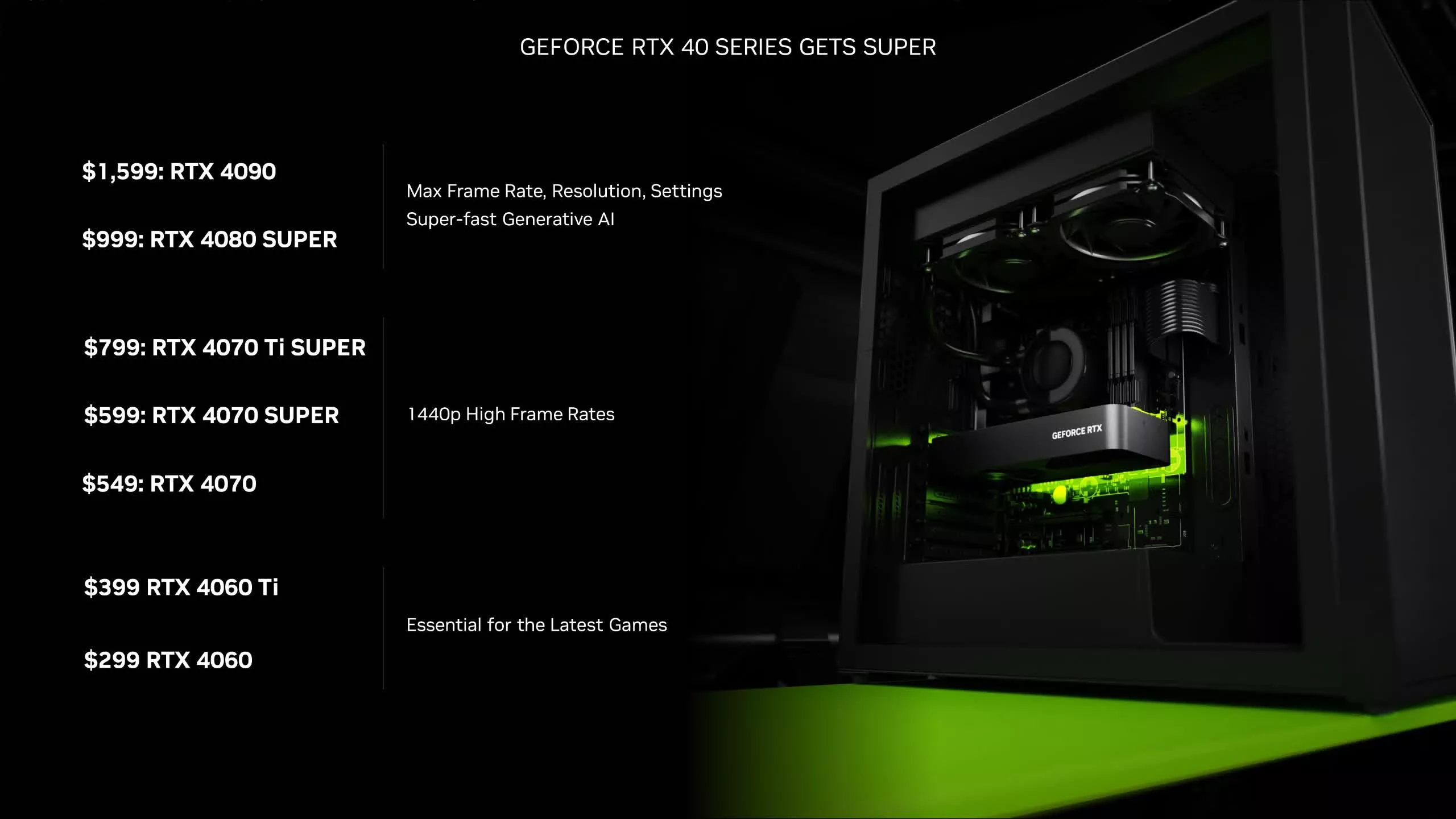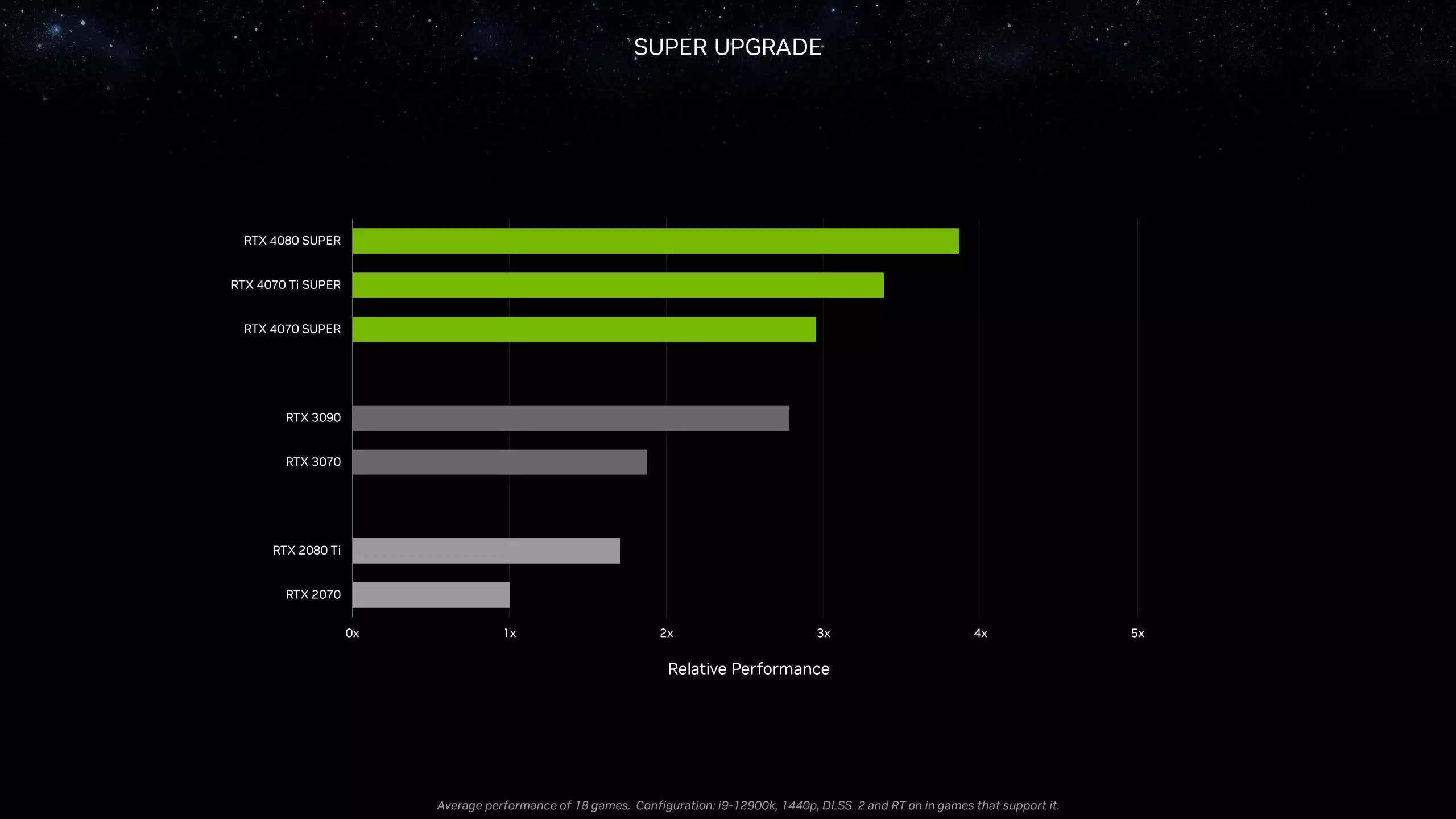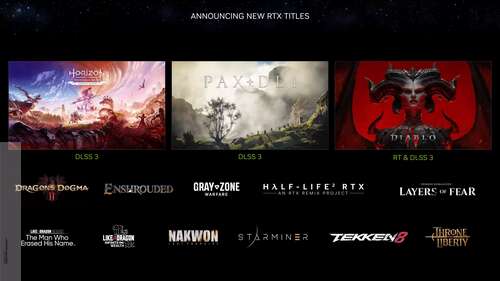Highly anticipated: As reports have been suggesting for some time now, Nvidia has launched three Super graphics cards at CES, all of which are coming out in January. These include the GeForce RTX 4080 Super, RTX 4070 Ti Super – yes that’s the official name – and the RTX 4070 Super. These new products give Nvidia’s GeForce line a much-needed upgrade in the mid to upper section of their stack.
The first product to hit the market is the RTX 4070 Super, available on January 17th at $600. This GPU is launching at the same price point as the original RTX 4070. However, the 4070 isn’t being discontinued; instead, it has received an official price cut to $550 – a price we first saw in the last few months of 2023.
The 4070 Super is still using AD104 silicon, similar to the 4070 and 4070 Ti, but receives a configuration closer to the 4070 Ti. Compared to the 4070, the SM count has increased from 46 to 56, bringing with it 7,168 CUDA cores – just shy of the 60 SMs and 7,680 CUDA cores of the 4070 Ti. However, the memory subsystem is the same as the RTX 4070, so we’re getting 12GB of GDDR6X memory on a 192-bit bus, providing 504 GB/s of bandwidth.
Nvidia has shown a performance slide demonstrating the difference relative to the RTX 3070 and RTX 2070, with and without frame generation. They also provided a performance claim relative to the RTX 4070. While this should be taken with a grain of salt, as it’s Nvidia’s own benchmarking, they claim the 4070 Super is 15% faster than the 4070 and 5% slower than the 4070 Ti. Although the core configuration has increased by 20%, the expected performance isn’t proportionally higher due to the unchanged memory bandwidth.
Effectively, Nvidia is offering a new product at the $600 price point that delivers approximately 15% more performance. This should allow it to better compete with the Radeon RX 7800 XT – a price segment where we saw intense competition in 2023. With the RTX 4070 now reduced to $550, the 4070 Super looks reasonable if the 15% performance increase holds true, given the Super model will be just 9% more expensive. The addition of unlocked cores has resulted in a 10% rise in TGP, which now sits at 220W.
The RTX 4070 Ti Super will be available next, on January 24th at $800, replacing the RTX 4070 Ti. The old model will be discontinued. The 4070 Ti Super represents the minimum improvement that should have been offered with the 4070 Ti at this price point.
The 4070 Ti Super upgrades from AD104 to AD103, bringing substantial memory improvements. We’re now getting a 256-bit memory interface with 16GB of GDDR6X memory, up from the previous 12GB. This increases memory bandwidth by 33 percent, now just under what the RTX 4080 offers, as the 4070 Ti Super’s memory isn’t clocked as high.
The core configuration is a cut-down AD103, though still higher than the original 4070 Ti on AD104, offering 66 SMs and 8,448 CUDA cores – a 10% increase, achieved at the same 285W TGP. Nvidia suggests this model should be 10% faster than the RTX 4070 Ti, combined with a significant increase in VRAM capacity, seems like a reasonable improvement. The SM configuration is a 13 percent reduction compared to the RTX 4080, with just 6 percent less memory bandwidth, suggesting this card might approach the 4080’s performance closely.
The key question will be how well this model competes against the RTX 4070 Super and AMD’s Radeon RX 7900 XT. This model seems more competitive in this price tier with AMD, although it might only be around 20 to 25% faster than the 4070 Super, priced 33 percent higher. This pricing strategy is typical in the graphics card market, where a modest to significant premium is often required for higher tiers of performance.
Finally, there’s the RTX 4080 Super, launching on January 31st at $1,000. This model has the least hardware changes compared to its non-Super predecessor, which is being discontinued. It’s still an AD103 GPU die, fully unlocked with 80 SMs and 10,240 CUDA cores. We’re still getting 16GB of GDDR6X memory with a slight frequency increase, taking it to 23 Gbps. Nvidia expects this card to be just 3% faster than the RTX 4080, which is understandable given the hardware similarities.
The big improvement to the RTX 4080 Super is the price. The original 4080 launched at $1,200, so Nvidia is now offering a marginally faster product for $200 less, a 17% discount. While this isn’t an extraordinary price, it’s a much-needed reduction considering the 4080’s lackluster sales at $1,200 or even $1,100.
At $1,000, this product fits well in Nvidia’s updated stack, offering around 20 percent more SMs than the 4070 Ti Super for a 25% higher price. Previously, a 50% higher cost was required for a 25% performance boost when moving from the 4070 Ti to the non-Super 4080 models.
On paper, this also gives the RTX 4080 Super price parity with the AMD Radeon 7900 XTX, although typically the XTX can be found slightly below $1,000. Our head to head testing of these two GPUs had the 7900 XTX and RTX 4080 closely matched for rasterization performance, with the 4080 faster in ray tracing. When the Radeon model was 15% cheaper, we didn’t view it as an automatic purchase but considered it worth contemplating for some users. With the RTX 4080 Super now priced closer to the XTX, it puts significant pressure on AMD to reduce the pricing of their flagship RDNA3 model.
Reviews for all three GPUs will be available close to their respective release dates. Nvidia will produce Founders Edition models for both the 4080 Super and 4070 Super, while the 4070 Ti Super will be available only through partner cards.
When we inquired about the possibility of other Super series graphics cards for the rest of the product stack, Nvidia responded with a concise “no comment.” This response doesn’t rule out the possibility of more GPUs in the 40 series, and frankly, we think some Super models are necessary to enhance the RTX 4060 tier.
We see Nvidia’s new GeForce RTX 40 Super cards as effective “fixes” for the lineup. All three models appear closer in specifications and pricing to where they should have been at their launch in late 2022 and early 2023. Whether these cards do enough to earn a solid recommendation in the current market is yet to be determined – they aren’t substantially faster based on Nvidia’s claims. However, it’s evident that one should refrain from purchasing a graphics card over $500 until these GPUs are released and fully benchmarked.
